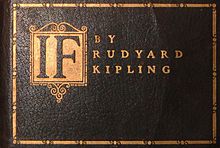If—
| If— | |
|---|---|
| by Rudyard Kipling | |
 Edition of "If—" by Doubleday, Page & Company, Garden City, New York, 1910. | |
| First published in | Rewards and Fairies |
| Publisher | Doubleday, Page & Company |
| Publication date | 1910 |
If— (1895) is a poem, by Rudyard Kipling, first published in the book Rewards and Fairies, (1910), and is a literary example of Victorian-era stoicism.[1] Kipling wrote the poem in tribute to the (failed) efforts of the British imperialist politician Leander Starr Jameson in advancing British hegemony in South Africa; the poem also was his paternal advice to his son, John Kipling, in dealing equally with success and failure in life.[2]
Publication
The initial publication of the poem "If—" was in the “Brother Square Toes” chapter of the book Rewards and Fairies (1910), a collection of Kipling’s poetry and short-story fiction. In the posthumously published autobiography Something of Myself (1937), Kipling said that his poetic inspiration for the poem was the military actions of Leander Starr Jameson, leader of the failed Jameson Raid (Dec. 1895–Jan. 1896) against South Africa to overthrow the Boer Government of Paul Kruger; the failure of that mercenary coup d’état aggravated the political tensions between Great Britain and the Boers, which led to the Second Boer War (1899–1902).[3][4]
Text

If you can keep your head when all about you
Are losing theirs and blaming it on you,
If you can trust yourself when all men doubt you,
But make allowance for their doubting too;
If you can wait and not be tired by waiting,
Or being lied about, don’t deal in lies,
Or being hated, don’t give way to hating,
And yet don’t look too good, nor talk too wise:
If you can dream—and not make dreams your master;
If you can think—and not make thoughts your aim;
If you can meet with Triumph and Disaster
And treat those two impostors just the same;
If you can bear to hear the truth you’ve spoken
Twisted by knaves to make a trap for fools,
Or watch the things you gave your life to, broken,
And stoop and build ’em up with worn-out tools:
If you can make one heap of all your winnings
And risk it on one turn of pitch-and-toss,
And lose, and start again at your beginnings
And never breathe a word about your loss;
If you can force your heart and nerve and sinew
To serve your turn long after they are gone,
And so hold on when there is nothing in you
Except the Will which says to them: “Hold on!”
If you can talk with crowds and keep your virtue,
Or walk with Kings—nor lose the common touch,
If neither foes nor loving friends can hurt you,
If all men count with you, but none too much;
If you can fill the unforgiving minute
With sixty seconds’ worth of distance run,
Yours is the Earth and everything that’s in it,
And—which is more—you’ll be a Man, my son![5]
Reception
As an evocation of Victorian-era stoicism—the “stiff upper lip” self-discipline, which popular culture rendered into a British national virtue and character trait—"If—" remains a valid cultural currency.[6] The British cultural-artefact status of the poem is evidenced by the parodies of the poem, and by its popularity among Britons.[7][8]
In India, a framed copy of the poem was affixed to the wall before the study desk in the cabins of the officer cadets at the National Defence Academy, at Pune. In Britain, the third and fourth lines of the second stanza of the poem: “If you can meet with Triumph and Disaster / and treat those two impostors just the same” are written on the wall of the players’ entrance to the Centre Court at the All England Lawn Tennis and Croquet Club, where the Wimbledon Championships are held.[2]
Influence
- Singer Joni Mitchell was inspired by the poem and made a musical tribute to it in the form of a song.
See also
References
- ^ Osborne, Kristen (28 April 2013). McKeever, Christine (ed.). "Rudyard Kipling: Poems Study Guide: Summary and Analysis of "If—"". GradeSaver. Retrieved 29 May 2013.
- ^ a b Wansell, Geoffrey (20 February 2009). "The remarkable story behind Rudyard Kipling's 'If' - and the swashbuckling renegade who inspired it". Mail Online. Associated Newspapers. Retrieved 29 May 2013.
- ^ "The New Britannica Encyclopædia", 15th Edition, volume 6, pp. 489–90.
- ^ Halsall, Paul (July 1998). "Rudyard Kipling: If". Internet History Sourcebooks Project. Fordham University. Retrieved 6 November 2011.
{{cite web}}: Cite has empty unknown parameter:|1=(help) - ^ "If— by Rudyard Kipling". Poems & Poets. Poetry Foundation. Retrieved July 15, 2013.
- ^ "Spartans and Stoics — Stiff Upper Lip". ICONS of England. Culture24. Retrieved 20 February 2011.[dead link]
- ^ Jones, Emma (2004). The Literary Companion. Robson. p. 25. ISBN 978-1-86105-798-3.
- ^ Robinson, Mike (2002). Literature and Tourism. The Thomson Corporation. p. 61. ISBN 1-84480-074-1.
{{cite book}}: Cite has empty unknown parameter:|1=(help)
External links
 Works related to If— at Wikisource
Works related to If— at Wikisource- Reading of "If—" on Wikicommons
- Free human-read audio recordings of "If—"
- Authentic digital editions archive of "If—"
